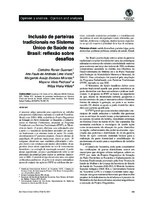| dc.contributor.author | Gusman, Christine Ranier | es_ES |
| dc.contributor.author | Viana, Ana Paula de Andrade Lima | es_ES |
| dc.contributor.author | Miranda, Margarida Araújo Barbosa | es_ES |
| dc.contributor.author | Pedrosa, Mayane Vilela | es_ES |
| dc.contributor.author | Villela, Wilza Vieira | es_ES |
| dc.date.accessioned | 2015 | |
| dc.date.available | 2015 | |
| dc.date.issued | 2015 | es_ES |
| dc.identifier.citation | Gusman, Christine Ranier,Viana, Ana Paula de Andrade Lima,Miranda, Margarida Araújo Barbosa,Pedrosa, Mayane Vilela,Villela, Wilza Vieira (2015) Inclusão de parteiras tradicionais no Sistema Único de Saúde no Brasil: reflexão sobre desafios. Rev Panam Salud Publica;37(4/5) 365-370,abr.-mai. 2015. Retrieved from http://www.scielosp.org/scielo.php?script=sci_arttext&pid=S1020-49892015000400026 | pt_BR |
| dc.identifier.uri | http://www.scielosp.org/scielo.php?script=sci_arttext&pid=S1020-49892015000400026 | es_ES |
| dc.identifier.uri | https://iris.paho.org/handle/10665.2/7709 | |
| dc.relation.ispartofseries | Rev Panam Salud Publica;37(4-5),abr.-mayo 2015 | es_ES |
| dc.subject | Saúde de mulher | pt_BR |
| dc.subject | Parteira leiga | es_ES |
| dc.subject | Parto domiciliar | es_ES |
| dc.subject | Políticas Públicas | es_ES |
| dc.subject | Sistema de saúde | es_ES |
| dc.subject | Brasil | pt_BR |
| dc.subject | Women's Health | es_ES |
| dc.subject | Midwives, practical | es_ES |
| dc.subject | Home Childbirth | es_ES |
| dc.subject | Public Policies | es_ES |
| dc.subject | Health Systems | en_US |
| dc.subject | Brazil | en_US |
| dc.title | Inclusão de parteiras tradicionais no Sistema Único de Saúde no Brasil: reflexão sobre desafios | pt_BR |
| dc.type | Journal articles | en_US |
| dc.rights.holder | Pan American Health Organization | en_US |
| dc.description.notes | O presente artigo apresenta uma experiência de trabalho com parteiras tradicionais realizada no estado do Tocantins, Brasil, entre 2010 e 2014, no âmbito do Projeto Diagnóstico da Situação do Parto Domiciliar no Tocantins e Cadastramento de Parteiras Tradicionais, vinculado ao Programa Trabalhando com Parteiras Tradicionais (PTPT), do Ministério da Saúde. O projeto objetivou uma articulação entre o parto e o nascimento domiciliares assistidos por parteiras tradicionais e os sistemas locais de saúde. No estado, identificaram-se 67 parteiras atuantes. Durante oficinas de capacitação, 41 parteiras tradicionais, dentre as quais 39 indígenas, discutiram suas realidades, dificuldades e soluções frente a um cotidiano com muitas adversidades. Essas parteiras foram ainda capacitadas no uso de instrumentos biomédicos e na condução da reanimação neonatal. A partir dessas experiências, surgiu o questionamento sobre a real efetividade da estratégia para incluir as parteiras tradicionais no SUS. O presente artigo discute esse tema com apoio na literatura pertinente. A carência de estudos sistemáticos acerca do impacto das ações do PTPT no cotidiano das parteiras, incluindo os desfechos perinatais e o remodelamento das práticas de saúde em populações rurais, ribeirinhas, quilombolas, de floresta e indígenas, implica lacunas importantes no que diz respeito à efetividade desse tipo de iniciativa.(AU) | pt_BR |
| dc.description.notes | The present article describes an experience with traditional birth attendants carried out in the state of Tocantins, Brazil, between 2010 and 2014. The experience was part of a diagnostic project to survey home deliveries in the state of Tocantins and set up a registry of traditional birth attendants for the Health Ministry's Working with Traditional Birth Attendants Program (PTPT). The project aimed to articulate the home deliveries performed by traditional birth attendants to the local health care systems (SUS). Sixty-seven active traditional birth attendants were identified in the state of Tocantins, and 41 (39 indigenous) participated in workshops. During these workshops, they discussed their realities, difficulties, and solutions in the context of daily adversities. Birth attendants were also trained in the use of biomedical tools and neonatal resuscitation. Based on these experiences, the question came up regarding the true effectiveness of the strategy to include traditional birth attendants in the SUS. The present article discusses this theme with support from the relevant literature. The dearth of systematic studies focusing on the impact of PTPT actions on the routine of traditional birth attendants, including perinatal outcomes and remodeling of health practices in rural, riverfront, former slave, forest, and indigenous communities, translates into a major gap in terms of the knowledge regarding the effectiveness of such initiatives.(AU) | en_US |

